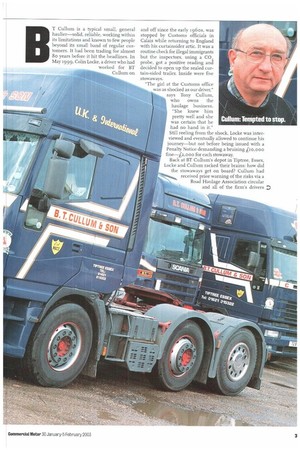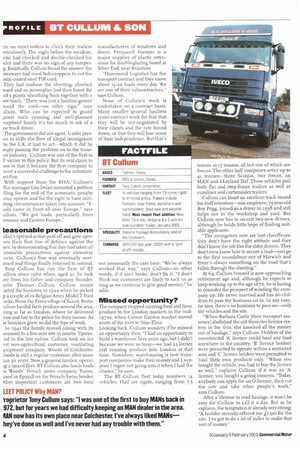T Cullum is a typical small, general haulier—solid, reliable, working
Page 33

Page 34

If you've noticed an error in this article please click here to report it so we can fix it.
within its limitations and known to few people beyond its small band of regular customers. It had been trading for almost 8o years before it hit the headlines. In May1999, Colin Locke, a driver who had worked for BT Cullum on
and off since the early 1960s, was stopped by Customs officials in Calais while returning to England with his curtainsider artic. It was a routine check for illegal immigrants but the inspectors, using a CO,. probe, got a positive reading and decided to open up the sealed curtain-sided trailer. Inside were five stowaways.
"The girl at the Customs office was as shocked as our driver," says Tony Cullum, who owns the haulage business. "She knew him pretty well and she was certain that he had no hand in it." Still reeling from the shock, Locke was interviewed and eventually allowed to continue his journey—but not before being issued with a Penalty Notice demanding a bruising Do ,0 oo firie—i2,000 for each stowaway.
Back at BT Cullum's depot in Tiptree, Essex, Locke and Cullum racked their brains: how did the stowaways get on board? Cullum had received prior warning of the risks via a Road Haulage Association circular and all of the firm's drivers !re on strict orders to check their trailers eticulously. The night before the incident, ieke had checked and double-checked his suer and there was no sign of any tamperg. Eventually, Cullum found the answer: the Dwaways had used bolt-croppers to cut the astic-coated steel TIR cord.
They had undone the sheeting, climbed ioard and an accomplice had then fused the rd's plastic sheathing back together with a ow-torch. "There was just a hairline groove ound the cord—no other sign," says _Alum. Who can be expected to guard ;ainst such cunning and well-planned ception? Surely it's too much to ask of a ne truck driver.
The government did not agree. Under presire to stifle the flow of illegal immigrants to the UK, it had to act—which it did by inply passing the problem on to the transwt industry. Cullum was one of the first to 11 victim to this policy. But its real claim to me is that it became the first company to ount a successful challenge to the automatic
With support from the RHA, Cullum's lice manager Lisa Dolan mounted a petition ding for the end of the automatic penalty atice system and for the right to have mita-ling circumstances taken into account. "Flails came in from all over Europe," says ullum. "We got loads, particularly from errnany and Eastern Europe."
leasonable precautions
olan's spirited action paid off and gave oper-ors their first line of defence against the nes, by demonstrating that they had taken all :asonable precautions against stowaway :cess. Cullum's fine was eventually overimed and things finally returned to normal. Tony Cullum has run the firm of BT ullum since 19 60 when, aged 2.1, he took ver from his father and company founder, ertie Thomas Cullum. Cullum senior acted the business in 1922 when he picked p a couple of ex-Belgian Army Model T Ford licks. From the Essex village of Salcot, Bertie ullum hauled farm produce around the area, Ding as far as London, where he delivered raw and hay to the police for their horses. As re business grew, so did the type of work.
In 1941 the family moved (along with its usiness) to a five-acre site in nearby Tiptree. .nd in the late 196 os, Cullum took on his rst non-agricultural customer, ventilating quipment company. Woods of Colchester. /acids is still a regular customer after more an 30 years. Now a general haulier, operatig a mixed fleet, BT Cullum also hauls loads )1Woods' French sister company Trains, ased in Epinall on the French-Swiss border. ather important customers are two local
manufacturers of windows and doors. Perrnacell Furness is a major supplier of plastic ertnisions for double-glazing based at Silver End, near Braintree.
"Hammond Logistics has the transport contract and they move about r5-20 loads every day. We are one of their subcontractors," says Cullum.
None of Cullum's work is undertaken on a contract basis. Many smaller general hauliers resist contract work for fear that they will be out-negotiated by their clients and the rate forced down, or that they will lose some of their independence. But that's
not necessarily the case here: "We've always worked that way," says Cullum—in other words, if it ain't broke, don't fix it. "I don't think our customers are likely to sack us as long as we continue to give good service," he adds.
Missed opportunity?
The company stopped carrying food and farm produce to the London markets in the midr970s, when Covent Garden market moved south of the river to Nine Elms.
Looking back, Cullum wonders if he missed an opportunity then: "I had an opportunity to build a warehouse here years ago, but I didn't because we were so busy—we had 23 lorries just running produce into London at that time. Nowadays. warehousing is how transport companies make their money and I suppose I regret not going into it when I had the chance," he says.
The BT Cullum fleet today numbers 14 vehicles. Half are rigids, ranging from 7.5 tonnes to 17 tonnes, all but one of which are Ivecos. The other half comprises artics up to 41 tonnes—three Scanias, two Ivecos, an MAN and a Leyland Daf. These vehicles pull both flat and step-frame trailers as well as euroliner and curtainsider trailers.
Cullum can boast an excellent track record for staff retention—one employee, 75-year-old Roy Pegg, joined as a driver in 1958 and still helps out in the workshop and yard. But Cullum now has to recruit two new drivers, although he holds little hope of finding suitable applicants.
"The youngsters now are just chauffeurs; they don't have the right attitude and they don't know the job like the older drivers. They don't even know how to secure a load—you go to the first roundabout out of Harwich and there's always something on the road that's fallen through the sheeting."
At 64, Cullum himself is now approaching retirement age and, although he expects to keep working up to the age of 7o, he is having to consider the prospect of winding the company up. He never married and has no children to pass the business on to. In any case, he says, there's no business to pass on—only the vehicles and the site.
"When Barbara Castle [then transport secretary] abolished the old three-tier licence system in the '6os, she knocked all the money out of haulage," says Cullum. Holders of the unrestricted 'A' licence could haul any load anywhere in the country; 'B' licence holders were permitted to operate within a restricted area and 'C' licence holders were permitted to haul their own products only. When you bought the vehicle, you had to buy the licence as well," explains Cullum; if it was an 'A' licence, you bought a going concern. "Today, anybody can apply for an 0-licence, then cut the rate and take other people's work," says Cullum.
After a lifetime in road haulage, it won't be easy for Cullum to call it a day. But as he explains, the temptation is already very strong: "A builder recently offered me Li.5m for the site. Eve got to do a lot of miles to make that sort of money."




























































































































































